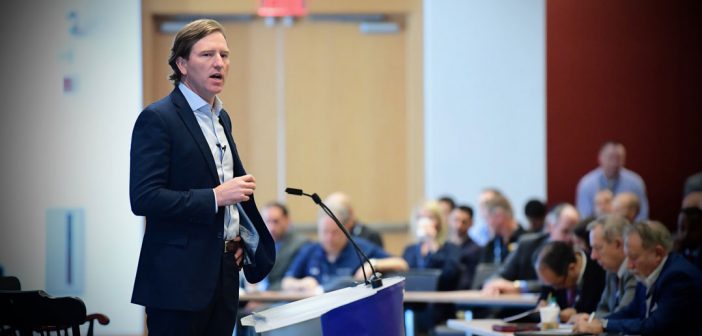“This is bigger than just protecting 2020. This is ultimately about defending democracy,” said Krebs, a keynote speaker on the last day of the 2019 International Conference on Cyber Security, held at Fordham Law School.
Three years ago, the Russian government interfered with the U.S. presidential election through the creation of thousands of fake social media accounts, which spread fabricated information to all corners of the country.
Krebs said his agency has been working to avoid similar strife in the upcoming elections. Over the past several months, he said CISA has been helping foreign countries improve their defenses against Russia, thereby gaining a deeper understanding of the techniques and tactics that the Russians use. Krebs anticipated that before the Russians strike the United States, they will most likely use somewhere in eastern Europe as a guinea pig, like Ukraine or Moldova. He also emphasized the importance of raising awareness of what the “threat environment” looks like and driving resources into defense methods, such as phishing campaign assessments.
There are still problems at home. He said five states—Delaware, Georgia, Louisiana, New Jersey, and South Carolina—use voting machines that provide no paper trail of the votes. No paper ballots means no ability to audit the vote, he said.
“We’ve got to get to a position where we can audit the vote, where we can understand what happened throughout the process,” Krebs said. “If you can’t audit the process, you can’t audit the network left or right, if you don’t know what happened … you’re not secure.”
But there’s an easier way to combat Russian hackers—and it starts right at home.
Last week, Krebs and his team released a website called war-on-pineapple.com: a simple, interactive five-step tutorial that shows Americans how Russian social-media efforts try to divide and troll them.
“What we’re trying to do is raise critical thinking across the American people about how we’re being manipulated by foreign actors,” Krebs said. “We’re trying to engage the American people, educate on the tools, techniques, and capabilities. Not just Russia, but others that are getting into it.”
In the past and present, Russia has used social media to “undermine the very public conscious[ness]of the American people,” he said. They follow five steps: identify a divisive issue (one divisive issue is whether or not pineapple belongs on pizza, hence war-on-pineapple.com), create a conversation on social media, stir up angst, drive the topic into mainstream news, and then “take it real world.”
“They generate real-world activities. They actually get on social media platforms and schedule events,” Krebs said. “And not just a rally in favor of something—they also organize the counterprotests.”
He emphasized that more must be done to increase the resilience of the American people. The “war on pineapple” is only the beginning.
“It’s up to every single one of us to engage, to increase awareness because it’s not one person. It’s not the federal government. It’s not a state or local official,” Krebs said. “It’s everyone that’s going to be in the effort to protect [the]2020 [elections]and defend democracy.”



